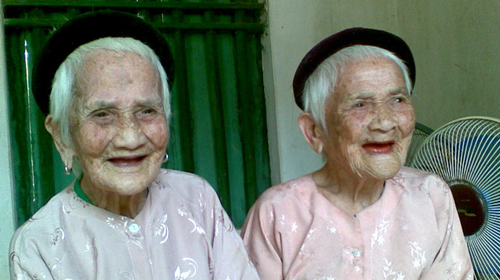My mother is 86 years old now and far from spry. The other day, when we arrived home from Vietnam on our annual sojourn, I received a stark reminder of the hardships of growing old – and also of caring for the aged and hobbled.
It was midday. When mom didn’t answer the doorbell, I walked around to the back door, thinking she was napping. Fortunately, it was unlocked. I entered and called out – and she called back.
It turned out that she was in the bathtub, fully clothed and dry – and was too weak to get out without help. If I hadn’t shown up just then, she might have spent the night there, until my brother or sister came to visit.
Mom’s predicament had me thinking about how old folks are cared for in the U.S. and in Vietnam. When I’m far from spry, I hope our children follow the Vietnamese tradition more than the modern American model. Vietnamese families, for the most part, take care of their own, while Americans increasingly use their prosperity to turn the job over to full-time nursing homes and hired hands.
Understand that these are broad-brush observations. But a few years back, my Saigon-born, Little Saigon-raised wife impressed me by suggesting that our kids’ increasingly infirm ba noi (paternal grandmother) move in with us, enabling us to be close and care for her in the December days of her life.
Most American wives, I’m pretty sure, would not be so quick to suggest taking in an elderly mother-in-law. But then, my wife’s ba ngoai (maternal grandmother) had lived with her family until she entered a hospital just days before old age claimed her, not long before our wedding. Her presence had enriched their lives.
So I liked the idea that our kids would be able to spend more time with the woman they call ba noi, and she would have more time with them. Perhaps we could play the role that my late aunt played for my own maternal grandmother, who died just a few months shy of 100. She had grown old in her own home in Alabama, which had also become the home of my aunt Izetta’s large family. That was the American eldercare model of the past.
Anyway, my mother considered our offer for about five seconds before she rejected it. She has lived in the same home for 60 years – alone since my father died in 1998. She wants to stay at home, independent – and, though she didn’t say so, I suspect she also worried that we’d come to think of her as a burden. Maybe she eventually would have changed her mind. But a few months later, my wife received the job offer that would take us to Hanoi. So instead of taking a greater role in my aging mom’s care, I’ve become the son who is usually on the other side of the world – and really should call home more often.
Every family wrestles with these issues. So does every society. China, which has yet to face the drawback of its one-child policy, has now adopted policies requiring that its increasingly urbanized young people do more to care for their parents who often remain alone in the home villages. In the U.S., it’s now common that the elderly are moved into full-time board-and-care facilities. It’s become a multi-billion-dollar industry and I understand why, depending on the health of the elderly, this is the best option. But sometimes it’s also the most selfish option. The quality varies greatly – and a visit can reveal what a sad, lonely fate this can be. Every situation is different. An 83-year-old friend who thinks that living with his son would drive him nuts is now planning to move into an old soldiers’ home, expressly for military veterans. He sees this as his best option – and, because he is much more mobile than my mother, hopes to save some money to come to visit us in Hanoi.
So what will we do about mom? Her “walker” has four wheels and platform that she sometimes uses as a table, sometimes as a seat. In time it seems she’ll require a wheelchair and will require greater hygienic care. My siblings and I have never discussed the nursing home option. My brother and sister live close enough to visit daily, or take turns doing so. Neither are inclined to move back home, like the son of a 90-year-old neighbor who has done just that. Another neighbor, who is pushing 100, has full-time live-in care – but my mom resists that idea too. So now we’re setting up a cellphone pre-programmed with vital phone numbers to wear on a lanyard around her neck. The question is: Will she really have this phone around her neck the next time she falls down?
The good news is that, for a few more weeks of summer, she’ll have her youngest son and grandchildren nearby – and we’ll have her.
And when we get back to Hanoi, we’ll need to call more often, on the new phone, to make sure she’s wearing it at all times, just in case.






















































